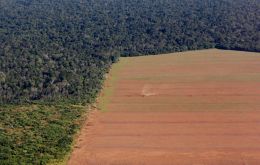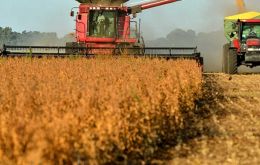MercoPress. South Atlantic News Agency
Tag: soy
-
Wednesday, July 29th 2020 - 07:44 UTC
Covid-19 in Argentine grains terminals and processing plants affecting operations

Argentina has reported its first cases of Covid-19 at port terminals that ship soy meal and oil to the world in a fresh blow to the global commodities trade already disrupted by the pandemic.
-
Wednesday, July 22nd 2020 - 08:00 UTC
Parana river insufficient water level benefitted exports from Brazilian ports

Due to the Paraná river drought, which affected Argentina’s soy oil-exporting capacity, Cattalini Terminais Marítimos, which handles almost 70% of Brazil’s soy oil exports through its facilities in the port of Paranaguá, predicts a 25% increase in shipments this year.
-
Tuesday, July 21st 2020 - 08:50 UTC
A fifth of Brazilian soy exports to EU may have come from illegally deforested land

A study published by Science magazine on July 16 indicated that a fifth of Brazilian soy imports received by the European Union may come from land that has been illegally deforested.
-
Saturday, July 4th 2020 - 08:00 UTC
International banks accuse Argentine major soy crusher of “diverting hundreds of millions of dollars” in a US court

Banks owed money by cash-strapped Argentine soy crusher Vicentin are accusing the company of diverting hundreds of millions of dollars and have asked a U.S. court to subpoena records as part of a lawsuit, including wire transfers and bank statements.
-
Monday, March 9th 2020 - 08:57 UTC
Argentine farmers begin four day sales strike to protest higher export taxes

Argentina’s main farm groups will hold a four-day sales strike this week, officials with local growers groups said on Thursday, to protest a tax hike that soy crushing companies warn will cripple investment in the key sector.
-
Monday, February 3rd 2020 - 07:26 UTC
Argentina's soybean crop forecasts increase to 53.1 million tons on favorable moisture conditions

Argentina's soybean harvest for the 2019/20 season is forecast at 53.1 million tons, the Buenos Aires grains exchange said last week, an improvement from a prediction it made towards the end of last year.
-
Wednesday, April 24th 2019 - 11:36 UTC
Argentina trying to sell its soy bumper crop to China

Argentina is pushing to increase agricultural trade with commodities-hungry China, as farmers on the country’s Pampas grains belt prepare for what is expected to be a bumper soybean harvest over the weeks ahead.
-
Friday, April 12th 2019 - 21:33 UTC
Instead of agrochemicals, Uruguay uses wasps to develop non-genetically modified soy

In Uruguay, non-genetically modified soy (GMO) soy is being developed in order to compete in a market saturated by the volume of crops in the region. Nevertheless, the country’s government hopes Uruguayan soy will stand out for its quality rather than for the volume of harvests motivating soy producers to use “biological controls” to combat pests.
-
Thursday, April 4th 2019 - 09:46 UTC
Argentine soybean farmers sign delayed-price contracts hoping for a US/China trade deal and higher prices

Soybean growers in Argentina are playing a waiting game, wagering on better prices ahead as the U.S. and China inch toward a trade deal and as nation’s currency keeps depreciating. Farmers on the Pampas arable belt have signed delayed-price contracts for almost three quarters of the 12.2 million metric tons they’ve sold to crushers and exporters so far, according to government data. That compares with 60% at the same stage last year.
-
Monday, January 28th 2019 - 08:32 UTC
Brazil's corn and soybeans January exports booming

Brazil is poised to export more corn than soybeans for the first time in a year this January, although sales of the oilseed remain high for the period, according to government and shipping data.
